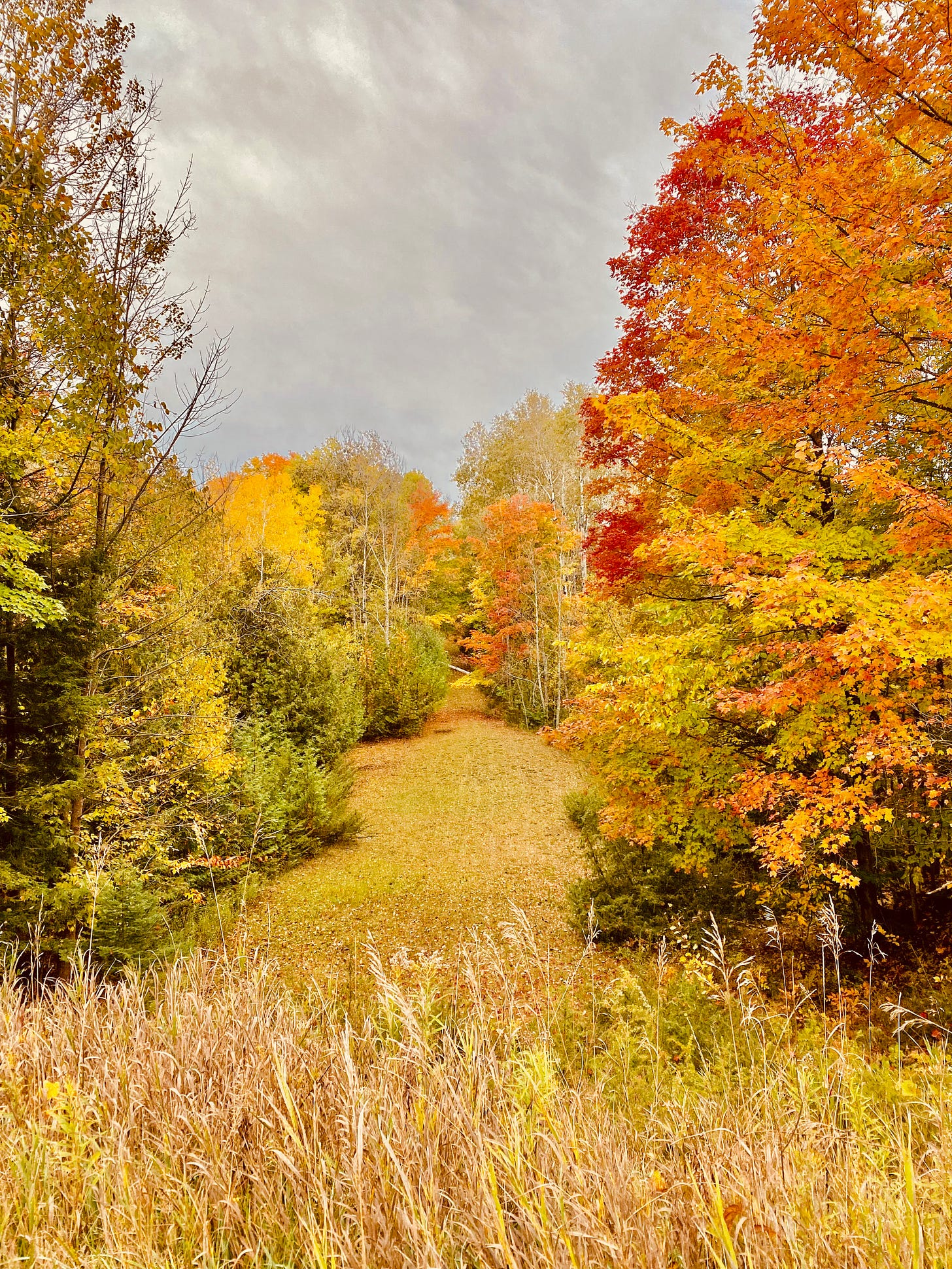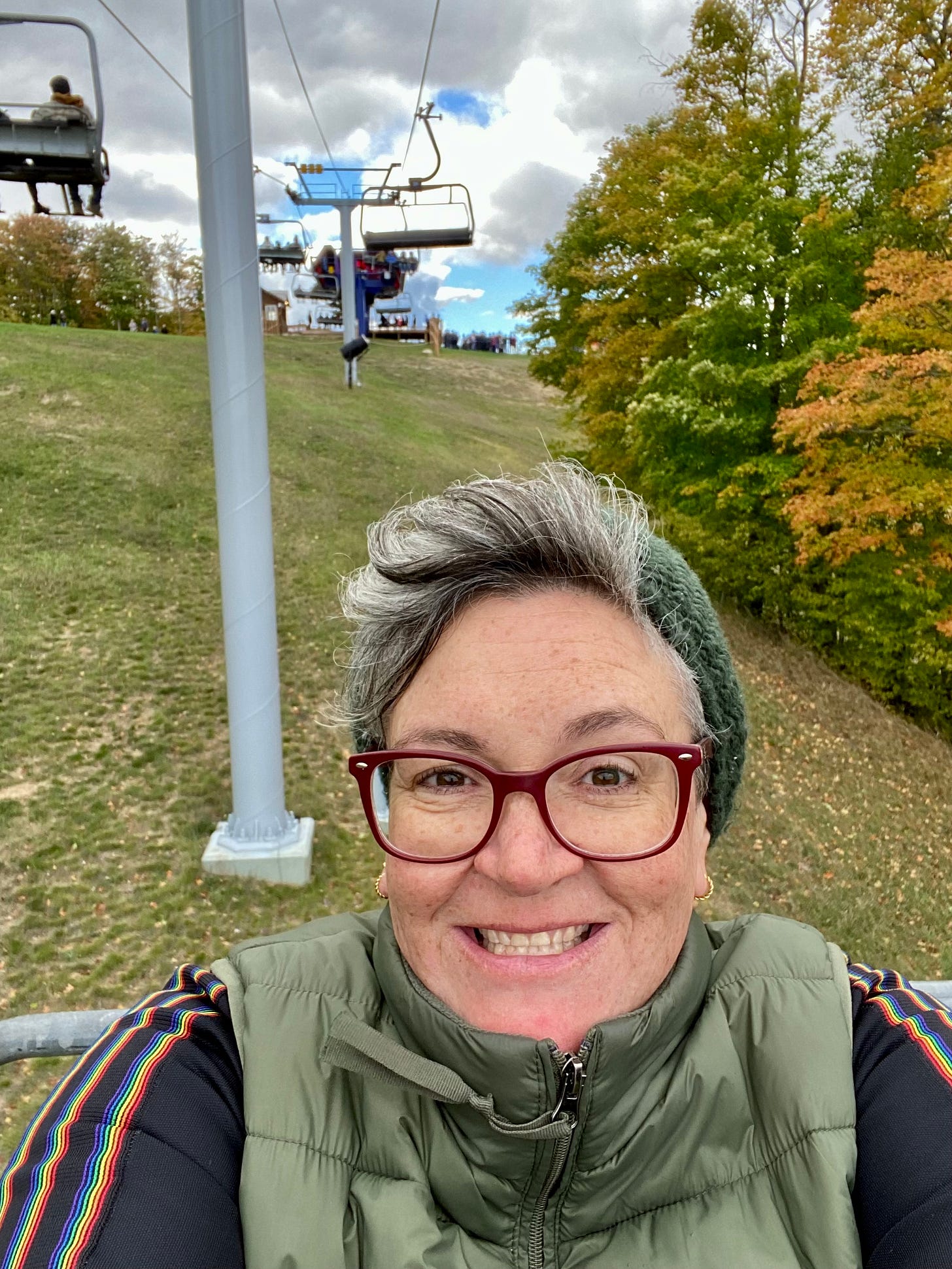My mom and I headed north late last week. Michigan is amazingly beautiful in mid-October. I’ve missed much of this beauty in my life. Fall is a season full of painful memories and for many years the start of my slow dissent into a deep depression that culminated with long hospitalizations.
The colors, the trees, the water, and the weather did not disappoint. Out driving, in between ooh-ing and aah-ing over the vibrant shades of red, orange, yellow, and green we talked a little about a lot and a lot about a little. About our own grief and heartaches, and the heart wrenching violence escalating around the world. Palestine and Israel. Ukraine and Russia. Our neighborhood in Detroit.
I wrote a post for this week before we left. It was about signs that pop up along life’s road confirming or challenging our direction. The more we drove and the more we talked the less confident I became in the direction of those words. They didn’t address anything currently happening in the world. I felt fearful of saying too much and uncomfortable saying nothing at all. Weary of adding to the chorus of privileged opinions and skeptical of silence.
I told my mom, “I don’t think people need to hear my thoughts.”
She replied, “maybe they want to hear your story.”
I pondered that. And then tried to imagine what story I might share.
We continued driving and talking. We stopped at a park and walked out to the beach. It was breathtaking, literally. The wind whipping. The waves rolling in with caps of white. Mom and the dog headed back to the car. I sat down on a log and whispered the psalmist’s cry, how long oh, God, how long.
And I was transported back to a car ride conversation with my grandpa. We rode together from my great aunt’s funeral service to the cemetery for her burial. I hadn’t seen my grandpa in quite some time. I wasn’t close with this aunt and increasingly disconnected from my whole family, but something pointed me there that day.
We barely had our seat belts fastened when my grandpa began his questions. He was a curious soul, sometimes annoyingly so, and also infamous for using air quotes. No small talk. He turned right to me asking, “how did you forgive the people who hurt you?” Putting forgive in air quotes. There was no question the people he was referring to.
“Well, Grandpa,” I said, “I’m not sure that I really have…I think I’ll always be working on it.”
There was a brief silence. And then he said, “I don’t know how to forgive the boys that killed your Aunt.”
I was stunned. Not that he was struggling with forgiveness, but that he talked about it. It had been almost six years since another of my grandma’s sister died so violently. Two young men—teenagers—broke into her home. My understanding is that it was a robbery that took a horrific turn when my aunt discovered them in the house. I knew how deeply it impacted him, like it did so many in the family, but he had never spoke of this with me before.
My grandpa shared that some nights he lay awake praying these two young men would greatly suffer and feel the same type of pain they inflicted. And that he once had similar thoughts about the people who abused me. He said that his initial reaction to learning what happened to me was that the perpetrators become the violated. This was the realist conversation my grandpa and I ever had about my childhood. I wonder now, what if his initial response was to come to me? To show love and care for me? How do we collectively show up in times of trauma? With softness and concern for the traumatized or with untamed scorn for those who inflicted the trauma?
My grandpa was a pretty peaceful man. An artistic soul. A poet, a pottery maker, a picture framer. And yet in the face of unthinkable violence, imagined revenge to be the best response. He was unique in many ways, but this isn’t one of them. Revenge and retaliation are common to the human experience. I’ve been there myself and moving from that mindset was hard and still something I wrestle with.
I asked my grandpa if he remembered learning that one of the young men who killed my aunt had spent time in a psychiatric hospital. He nodded affirmatively. I asked him if he knew that I too had been a patient at that hospital.
“That same hospital?” he inquired. Putting same in air quotes.
“Yes Grandpa, that hospital.”
When I learned what happened to my aunt I was sad and angry and racking my brain to understand how anyone could do something so heinous to such a gentle soul, to anyone for that matter. And when I learned that I had something in common with one of the perpetrators it didn’t excuse them, or free them from consequences, or justify their actions, or erase the pain, or instantly dull the emotions. But it humanized them. And that changed my understanding of crime and punishment, and violence and war. And repair and redemption.
Yes, I once fantasized about my abusers being abused. And all that did was add to my shame and self-hatred, and fuel the depression that was consuming my entire existence. It took years of intense internal work to realize the energy I was putting into plotting revenge was depleting the energy required to heal.
“Grandpa,” I said with tears matching the size of rain drops on the windshield, “if the people who abused me were abused in that same violent way, who would that have helped?”
“What has helped you” he asked. Putting helped in air quotes.
These words spilled out, “accepting I could never undo what happened and making the very conscious decision to never use what happened to me as a reason to do it to someone else.”
His response seemed strange at the time, almost like he was changing the subject. Today I think I get it. It’s all connected. He wanted to know how God could be good when God allows people, like his mother who died young from cancer, to suffer. And if I thought heaven was real and how to really get there.
As we drove along the back roads, near his childhood home, there was a presence filling the car, just as real as the heat blowing from the vent. We both had things to say and things we needed the other to hear. The Spirit moved us to that place. We allowed the Spirit to move us.
We arrived at the cemetery—where a month later my grandpa too would be laid to rest—before I could even begin to answer his questions. Later that day he gave me a folder filled with poems he wrote many years before. I read them. I still read them once in a while. And I wish we had known each other better and had these conversations sooner.
I think sometimes he was really more sad than angry. Desperately wanting to understand why things happened. Anger isn’t all and always bad, but certainly it’s powerful. And when we’re not careful can quickly move us to revenge. Sadness is often and easily perceived as weak, and when repeatedly suppressed leads to depression and despair. And when we are willing to acknowledge and honor our sadness and grief, it has the potential to steer us, and others, toward wholeness.
My face is almost numb sitting on this hard, cold log watching the waves and battling the wind. My heart feels like a storm has just come through and also like there’s a calmness settling in. Memories of my life and current realities of our world fill me with anger and sadness and grief. And at times I want to lift my hands in surrender to violence and war and evil. Memories of honest conversations and weird air quotes fill me with hope and a sense of possibility. And a longing to be part of healing humanity’s brokenness.
I do not know how a drive to a cemetery brought so much life, and I do know retaliation guides the living to a shallow grave.
I do not know the path to world peace, and I do know revenge will never lead us there.
Water-fully Yours, Rebecca
10 Camels








Your words always stir me. Today brought tears!
Perhaps many of us had the same grandparents! We just didn't have them long enough.